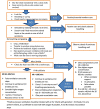The incidence and determinants of the meconium-aspiration syndrome among mothers with meconium-stained amniotic fluid after emergency cesarean section: A prospective cross-sectional study in a specialized hospital, south Ethiopia
- PMID: 37033171
- PMCID: PMC10076781
- DOI: 10.3389/fped.2023.1149398
The incidence and determinants of the meconium-aspiration syndrome among mothers with meconium-stained amniotic fluid after emergency cesarean section: A prospective cross-sectional study in a specialized hospital, south Ethiopia
Abstract
Background: Meconium aspiration syndrome is respiratory distress diagnosed in neonates delivered with meconium-stained amniotic fluid that is unexplained by other pathologies. It has severe neonatal respiratory complications and a significant impact on the prevalence of neonatal mortality.
Objective: To identify the incidence and determinants associated with meconium aspiration syndrome among mothers with meconium-stained amniotic fluid after emergency cesarean section in Wolkite University specialized hospitals in Ethiopia from September 1, 2021, to August 30, 2022.
Method: An institution-based cross-sectional study was done prospectively through meticulous chart review and interviews with 275 mothers with meconium-stained amniotic fluid who gave birth with an emergency cesarean section. Data were entered using EpiData 7 and analyzed with SPSS 26. The association between independent variables and the meconium-aspiration syndrome was estimated using an odds ratio with 95% confidence intervals. The statistical significance of the association was declared at a p-value of 0.05.
Result: The prevalence of the meconium-aspiration syndrome is 28.7%. The factors associated are: latent phase (AOR: 2.580; 95% CI: 1.126, 5.913), low 1st minute APGAR score (AOR: 2.43; 95% CI: 0.892, 6.625), and thick meconium (AOR: 31.018; 95% CI: 9.982, 96.390). The neonatal death rate associated with meconium aspiration syndrome is 1.8%, and thick meconium contributed to 65% of admissions to the neonatal intensive care unit and all deaths.
Conclusion: The incidence of meconium aspiration syndrome is high, and thick meconium, meconium at early labor, and low APGAR scores all contributed to this. Thick meconium has a substantial effect on neonatal mortality and morbidity. Therefore, an improvement in the quality of obstetric and neonatal care through early intervention in the case of thick meconium and meconium in the early phase of labor is recommended.
Keywords: APGAR; MAS; MSAF; fetal distress; prolonged labor.
© 2023 Tantu, Zewdu, Degemu and Yehualeshet.
Conflict of interest statement
The authors declare that the research was conducted in the absence of any commercial or financial relationships that could be construed as a potential conflict of interest.
Similar articles
-
Prevalence of meconium-stained amniotic fluid and factors associated with emergency cesarean section: multicenter cross-sectional study in south central Ethiopia.Front Glob Womens Health. 2024 Dec 23;5:1516665. doi: 10.3389/fgwh.2024.1516665. eCollection 2024. Front Glob Womens Health. 2024. PMID: 39763630 Free PMC article.
-
Prevalence and factors associated with low 5th minute APGAR score among mothers who birth through emergency cesarean section: prospective cross-sectional study in Ethiopia.BMC Pregnancy Childbirth. 2025 Mar 25;25(1):342. doi: 10.1186/s12884-025-07456-9. BMC Pregnancy Childbirth. 2025. PMID: 40133944 Free PMC article.
-
Determinants of low fifth minute Apgar score among newborns delivered by cesarean section at Wolaita Sodo University Comprehensive Specialized Hospital, Southern Ethiopia: an unmatched case control study.BMC Pregnancy Childbirth. 2022 Aug 26;22(1):665. doi: 10.1186/s12884-022-04999-z. BMC Pregnancy Childbirth. 2022. PMID: 36028804 Free PMC article.
-
Tracheal suction at birth in non-vigorous neonates born through meconium-stained amniotic fluid.Cochrane Database Syst Rev. 2021 Jun 16;6(6):CD012671. doi: 10.1002/14651858.CD012671.pub2. Cochrane Database Syst Rev. 2021. PMID: 34133025 Free PMC article.
-
Prolonged and post-term pregnancies: guidelines for clinical practice from the French College of Gynecologists and Obstetricians (CNGOF).Eur J Obstet Gynecol Reprod Biol. 2013 Jul;169(1):10-6. doi: 10.1016/j.ejogrb.2013.01.026. Epub 2013 Feb 20. Eur J Obstet Gynecol Reprod Biol. 2013. PMID: 23434325 Review.
Cited by
-
Prevalence of meconium-stained amniotic fluid and factors associated with emergency cesarean section: multicenter cross-sectional study in south central Ethiopia.Front Glob Womens Health. 2024 Dec 23;5:1516665. doi: 10.3389/fgwh.2024.1516665. eCollection 2024. Front Glob Womens Health. 2024. PMID: 39763630 Free PMC article.
-
Prevalence and factors associated with low 5th minute APGAR score among mothers who birth through emergency cesarean section: prospective cross-sectional study in Ethiopia.BMC Pregnancy Childbirth. 2025 Mar 25;25(1):342. doi: 10.1186/s12884-025-07456-9. BMC Pregnancy Childbirth. 2025. PMID: 40133944 Free PMC article.
-
Recurrence of hypoglycaemia and associated factors among neonates admitted with perinatal asphyxia in Northwest Ethiopia: multicentre, retrospective follow-up study with negative binomial regression.BMJ Open. 2025 Apr 5;15(4):e096158. doi: 10.1136/bmjopen-2024-096158. BMJ Open. 2025. PMID: 40187778 Free PMC article.
-
Determinants of meconium-stained amniotic fluid among laboring mother in Ethiopia, systematic review and meta-analysis.Front Glob Womens Health. 2024 Jul 5;5:1393145. doi: 10.3389/fgwh.2024.1393145. eCollection 2024. Front Glob Womens Health. 2024. PMID: 39035127 Free PMC article.
-
Meconium aspiration syndrome and associated factors among neonates admitted at neonatal intensive care unit at Northwest Ethiopia comprehensive specialized hospitals Northwest Ethiopia 2023.BMC Pediatr. 2025 Mar 5;25(1):167. doi: 10.1186/s12887-024-05181-4. BMC Pediatr. 2025. PMID: 40038672 Free PMC article.
References
-
- Gupta V, Bhatia B, Mishra O. Meconium stained amniotic fluid: antenatal, intrapartum and neonatal attributes. Indian Pediatr. (1996) 33:293–8. - PubMed
-
- parter J. Meconium aspiration syndrome: Pathophysiology, clinical manifestations, and diagnosis (2022).
-
- Abramovich DR, Gray ES. Physiologic fetal defecation in midpregnancy. Obstet Gynecol. (1982) 60(3):294–6. - PubMed
LinkOut - more resources
Full Text Sources


